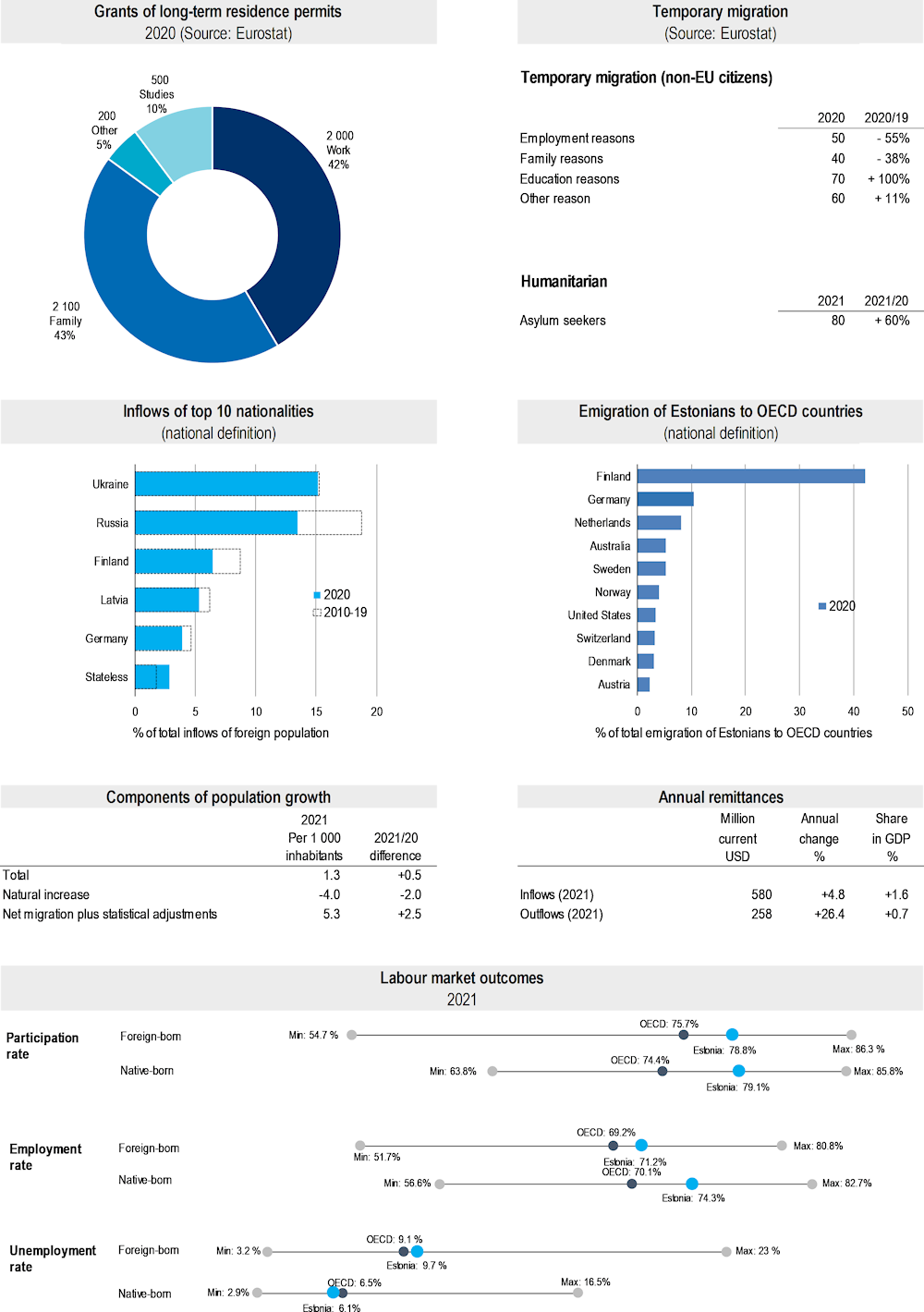In 2020, 4 800 new immigrants obtained a residence permit for longer than 12 months in Estonia (excluding EU citizens), ‑19.3% compared to 2019. This figure comprises 41.5% labour migrants, 43.5% family members (including accompanying family), 10.2% who came for education reasons and 4.7% other migrants. In addition, 2 700 intra-EU postings were recorded in 2020, a decrease of ‑46% compared to 2019. These posted workers are generally on short-term contracts.
Ukraine, Russia and Finland were the top three nationalities of newcomers in 2020. Among the top 15 countries of origin, Russia registered the largest decrease (‑300) in flows to Estonia compared to the previous year.
In 2021, the number of first asylum applicants increased by 66.7% to reach around 75. The majority of applicants came from Afghanistan (15), Russia (10) and Belarus (5). The largest increase since 2020 concerned nationals of Afghanistan (15). Of the 75 decisions taken in 2021, 67% were positive.
Starting from August 2020, an amendment to the Aliens Act enables applications for the digital nomad visa. Under this scheme, visa holders will be able to work remotely from Estonia for an employer in another country, or as freelancers. Digital nomads can only come to work in Estonia through a mediator who assumes responsibility for their stay. Granting a visa to a digital nomad is subject to the general terms, including having sufficient funds for staying in Estonia. The implementation of the digital nomad visa programme will be phased. In the first stage, foreigners who can prove they are digital nomads will be allowed to apply for the visa.
The preparation of a new national integration plan for 2021‑30 is underway, which will formulate the objectives of the integration policy of Estonia and the activities needed to achieve them. The state wishes to recognise the value of everyone in society, support cultural diversity, and promote the Estonian language and culture. The new integration plan will include activities designed for native Estonians as well as the long-term foreign residents of Estonia. More attention will also be paid to new immigrants and refugees, as well as compatriots living outside Estonia.
New regulations aimed at preventing disregard for employment rules in Estonia entered into force in July 2020. Under these amendments, the lawfulness of the employment of a foreigner is the responsibility of the company in Estonia that gains actual benefit from the foreigner’s work. The obligation to prove the lawful grounds of employment extends to companies using temporary agency staff. These amendments also ensure that the income tax payable by foreigners working in Estonia is received in Estonia.
The government approved an amendment to the Citizenship Act, which allows the Estonian citizenship to be removed from a person who has committed a crime against the state, such as treason or terrorist offences. This amendment only applies to people having acquired Estonian citizenship through naturalisation.
The government approved a draft act concerning the creation of a national automated biometric identification system (ABIS) database. In the first stage, biometric data collected in offence proceedings will be transferred to ABIS. In the second stage, biometric data from the Identity Documents Database, the Database of Prohibitions on Entry and the Visa Register, will be transferred to ABIS.
As of April 2021, background checks on e‑residency applicants were reinforced, in the context of the programme’s growth. An e‑resident’s digital ID may not be issued to a person who is a threat to public order or national security.
For further information: www.politsei.ee | www.stat.ee | www.siseministeerium.ee | www.workinestonia.com | www.tootukassa.ee

